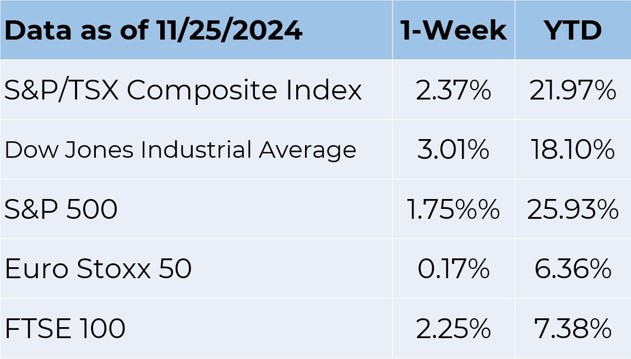Weekly Market Commentary November 28 2024
The Markets
Canada Deteriorating Living Standards
Governments nationwide must alter their strategies, as stagnant economic growth and falling living standards gain more attention. The living standards in Canada have been steadily declining in recent years due to weak economic growth. The federal and provincial governments have largely lost the chance to reform a crucial area impeding economic growth.
Canadians are suffering from a faltering economy, but governments nationwide consistently fail to take significant action to reduce the nation's high taxes, even though they hinder economic growth. According to a recent study, Canada has comparatively high marginal personal income tax rates when compared to the U.S. and many other nations.
High taxes reduce people's reward for participating in profitable economic activities. In return, people become less motivated to put in more hours or start their businesses when there are fewer rewards. In other words, when people are paid less for their labour, they are likely to work fewer hours than they otherwise would, which negatively impacts the economy.
A much-needed economic boost would result from making Canada's income taxes more competitive with those in other jurisdictions. Friendly and competitive tax regimes help nations attract and retain a highly skilled labour force, which is also crucial to economic growth.
The Bank of Canada has already swung into action, trying to curtail the risk of the Canadian economy plunging into recession. By cutting the key benchmark by 50 basis points last month, the central bank sent the most unambiguous indication of its willingness to do everything possible to steer the economy into a soft landing.
Additionally, the 50-basis-point cut to 3.75 per cent seeks to make it easier for people to access cheap loans and financing from banks, which is expected to impact the economy positively. The interest rate cut was also expected to address the muted business sales and a tepid consumer sentiment.
Even as living standards in Canada deteriorate, the stock market has remained a buzz of activities soaring to record highs. The country’s main stock index hit a new record high, helped by solid real estate sector gains that benefit from lower interest rates.
The S&P/TSX climbed to a high of 25 504, setting a third straight session of record-high closing. The gain came as markets reacted to Donald Trump's choice of Scott Bessent as the Treasury Secretary. Unlike Trump's aggressive proposed measures, Bessent is expected to adopt a lighter approach towards tariffs. With Canada being the U.S.'s biggest trading partner, any sense that the new administration would not be harsh on tariffs will always be good for the economy.
The post-election rally resumed.
Investors shook off concerns about interest rates and inflation, and U.S. stocks climbed higher last week. The Standard & Poor’s (S&P) 500 Index gained every day last week, and the rally wasn’t limited to a few popular stocks: 425 of the companies in the index finished the week higher, according to Jacob Sonenshine of Barron’s.
“Beneficiaries of the incoming administration’s looser regulation and business-friendly stance put forth strong showings this week. Stocks gained while [cryptocurrency] crushed doubters and the dollar extended gains into an eighth week, the currency’s longest run of the year. Blue chips and small caps led Friday’s equities advance as this year’s big tech winners struggled to gain ground,” reported Cristin Flanagan of Bloomberg.
It has been a great year to own U.S. stocks. The S&P 500 is up more than 25 per cent so far this year, performing significantly better than major indexes in Europe, Asia, and emerging markets, reported Lewis Krauskopf of Reuters. The catch is that markets are trading at heady valuations.
“…The broadening market can’t hide just how expensive stocks have become. The S&P 500 trades at 22.1 times 12-month forward earnings…the highest since 2020, when it hit 22.9 times. To see multiples meaningfully higher than that, one has to go back to the dot-com era, when the index traded at more than 25 times earnings,” reported Sonenshine of Barron’s.
Not everyone had an appetite for risk last week. The price of gold, which many investors consider to be a safe haven when markets are volatile, rose amid escalating tensions in the Russia-Ukraine war, reported Yvonne Yue Li of Bloomberg.
Major U.S. stock indices finished the week higher. Treasury yields were mixed last week, with the yield on the benchmark 10-year U.S. Treasury moving lower over the week and the yield on the two-year U.S. Treasury moving higher.

HOW TO HAVE AN ESTATE OR TAG SALE. Estate and tag sales can be emotional experiences. Usually, these sales are scheduled around major life changes such as the need to:
- Relocate or downsize,
- Move to independent or assisted living, or
- Settle the estate of a loved one
Organizing a sale is hard work, and parting with your belongings or those of a loved one is never easy, especially when they have sentimental value. That may be why many people opt to hire an estate planning company to manage these sales. The cost to do so is usually 30 per cent to 40 per cent of sale proceeds. However, estate sale companies “typically provide a gross sales minimum. This means that the total value of all the items to be sold must meet or exceed that value,” reported Doug Luftman of Trust & Will.
The other option is to organize and hold the sale yourself. If you choose that route, here are three tips that can help make an estate sale successful.
- Hire an appraiser. As the Antiques Roadshow demonstrates, it is difficult to know the value of some Undervaluation applies to antiques and everyday items. For instance, the portable ultrasound your uncle bought when he was recovering from surgery, which has been gathering dust on the shelf ever since, may be worth a whole lot more than you think it is. An appraiser can help ensure you don’t undervalue sales items, reported Heidi Mitchell in AARP Magazine.
- Promote the sale. Posting a hand-written sign near your sale site is unlikely to attract the number of buyers you Luftman recommended advertising your estate sale on social media sites and online marketplaces, as well as local newspapers. Mitchell suggested that the advertisements could include hashtags for applicable key words. These may include #highend, #designer, #oneofakind, and #collectors.
- Choose payment options carefully. Some estate sale shoppers will have cash, others will want to pay Think carefully about what types of payment you will accept and the tools you will need to accept them, reported Patrick Villanova and Arturo Conde in SmartAsset. For instance, you will need to have change and a lock box on hand for cash transactions, and an app on a phone or tablet for digital transactions.
Organizing an estate sale on your own saves on cost, but requires planning and coordination, as well as a team to oversee the sale. Outsourcing the sale has a higher cost, but requires less time, effort, and emotional stress. Everyone needs to decide which approach is the best one for their situation.
Weekly Focus – Think About It
“Estate- and tag-sale companies mainly deal with two generations: homeowners born during the Great Depression…and boomers looking to pare down. The groups have different reputations in the business. Depression-era homeowners are known for their pack-rat behaviour, and the boomers are known for just having a lot of really nice stuff —the result of having lived through the perfect time in history to consume amply in early adulthood.”
—Lizzie Feidelson, The New Yorker
Best regards,
Eric Muir
B.Comm (Hons. Finance), CIM®, FCSI
Senior Portfolio Manager
Derek Lacroix
BBA, CIM®, CFP®
Associate Portfolio Manager

P.S. Please feel free to forward this commentary to family, friends or colleagues. If you would like us to add them to the list, please reply to this email with their email address and we will ask for their permission to be added.
Disclaimer:
Information in this article is from sources believed to be reliable, however, we cannot represent that it is accurate or complete. It is provided as a general source of information and should not be considered personal investment advice or solicitation to buy or sell securities. The views are those of the author, Eric Muir and Derek Lacroix and not necessarily those of Raymond James Ltd. Investors considering any investment should consult with their Investment Advisor to ensure that it is suitable for the investor’s circumstances and risk tolerance before making any investment decision. Raymond James Ltd. is a Member Canadian Investor Protection Fund.

